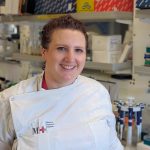This project will build on Dr Campbell’s work in MS health economics to measure the broader economic impact of MS.
Dr Campbell’s work as part of the Health Economic Impact of MS in Australia report has estimated that the cost of MS to the Australian society was $2.5 billion in 2021. As disability for the person living with MS increases from no disability to severe disability, this cost increases by almost 300%. Additionally, the numbers of people being diagnosed with MS is rapidly accelerating – 30% in the past four years.
This project aims to measure the true economic cost and to also prevent these costs of increased disability by increasing resources for MS. To do this, the project will include five connected phases of research that will:
Dr Campbell and her team have been working toward measuring the broader economic impacts of MS for people living with MS, their carers and supporters and the broader Australian society. These impacts will be included in their health economics model. A community of interest will be created in 2026 to make the model accessible for the MS community and researchers worldwide.
To date, Dr Campbell has found that the average cost of caring for people with MS increases dramatically as disability severity increases, but the costs were based on the perspective of the person with MS, not the carers themselves.
Over the next year, Dr Campbell will launch a specialized MOOC and gather further data about costs from carers and supporters. The specialized MOOC is for carers and supporters of people living with MS and will have three modules. The final model about self-care will help carers and supporters avoid burnout and compassion fatigue.
Dr Campbell and her team have also prepared a paper that examines existing online resources for carers and supporters for people with MS. This included podcasts, guidelines and flyers, which Dr Campbell found were often fragmented and did not focus on self-care.
Data gathering for NDIS costs is underway and will be examined closely during 2025. Costing the MS prodrome with Canadian colleagues is also underway and Dr Campbell will travel to Canada in 2026 to complete this.
Henson, G. J., van der Mei, I., Taylor, B. V., Scuffham, P., Chen, G., & Campbell, J. A. (2025). A systematic review of minimum important changes for generic multi-attribute utility instruments and recommendations for their estimation. EUROPEAN JOURNAL OF HEALTH ECONOMICS, 17 pages. doi:10.1007/s10198-025-01778-3
Last updated: 31 March 2025
Professor Andrew Palmer
Professor Ingrid van der Mei
$225,000
2024
3 years
Current project




